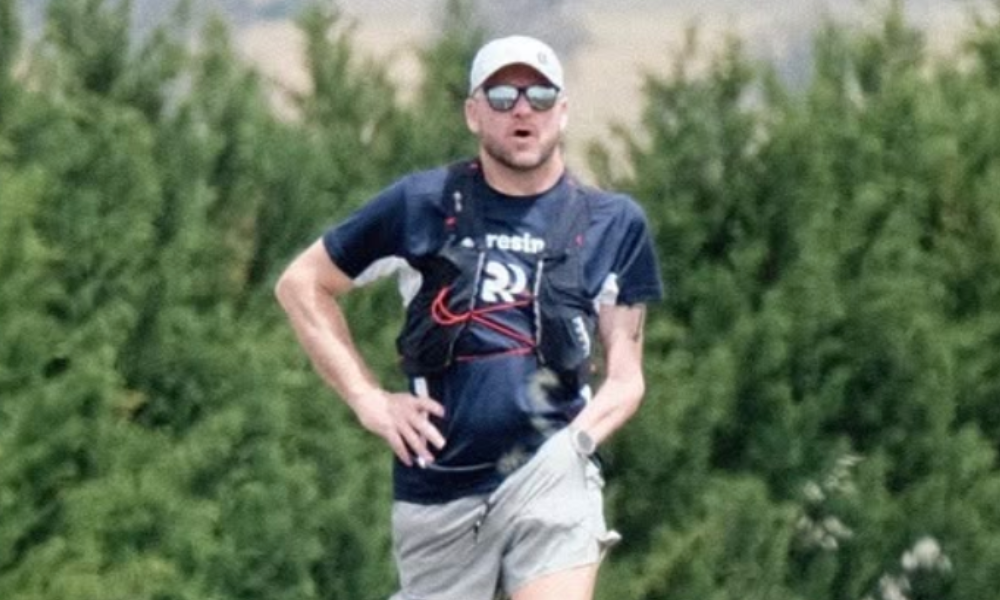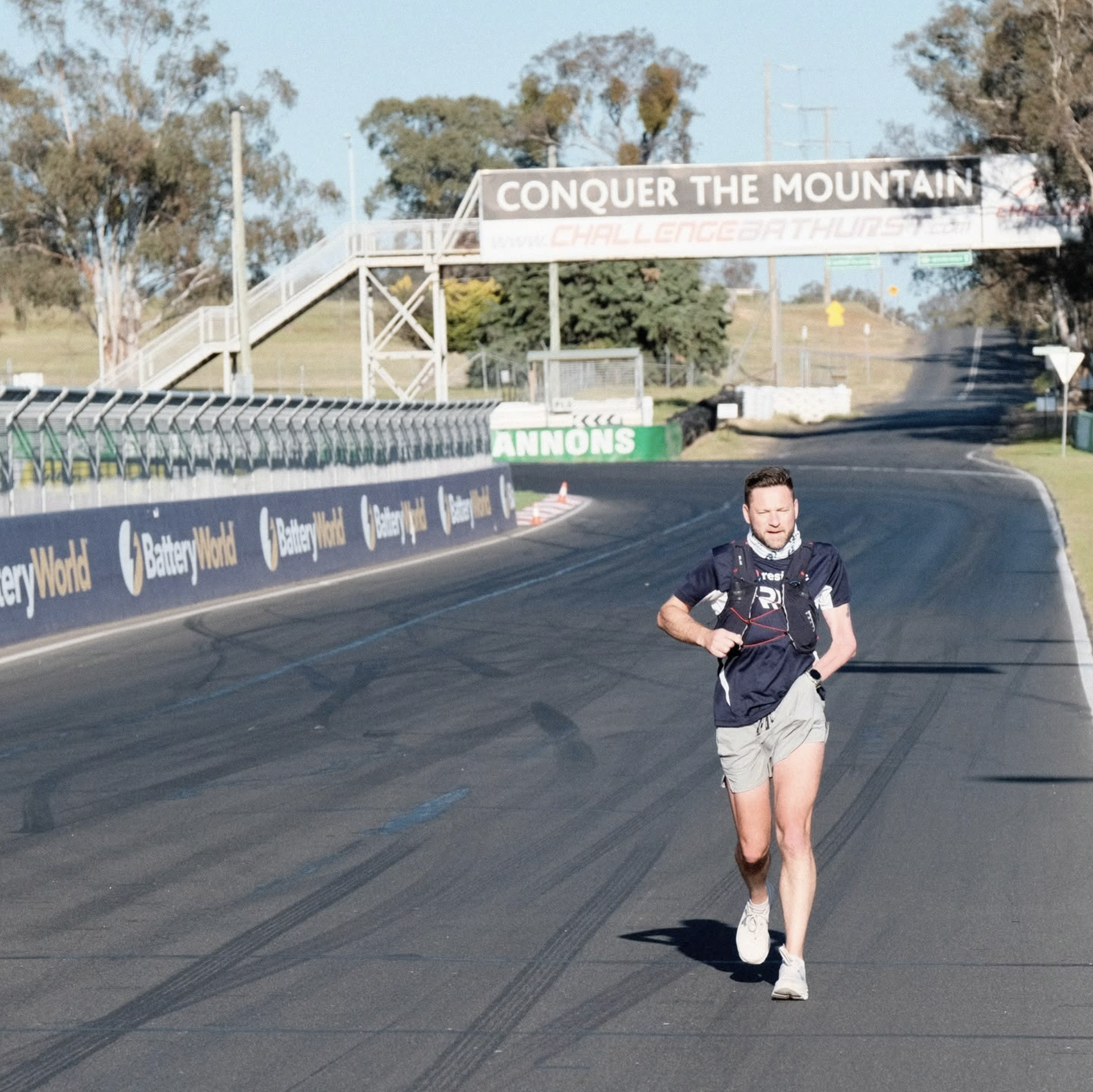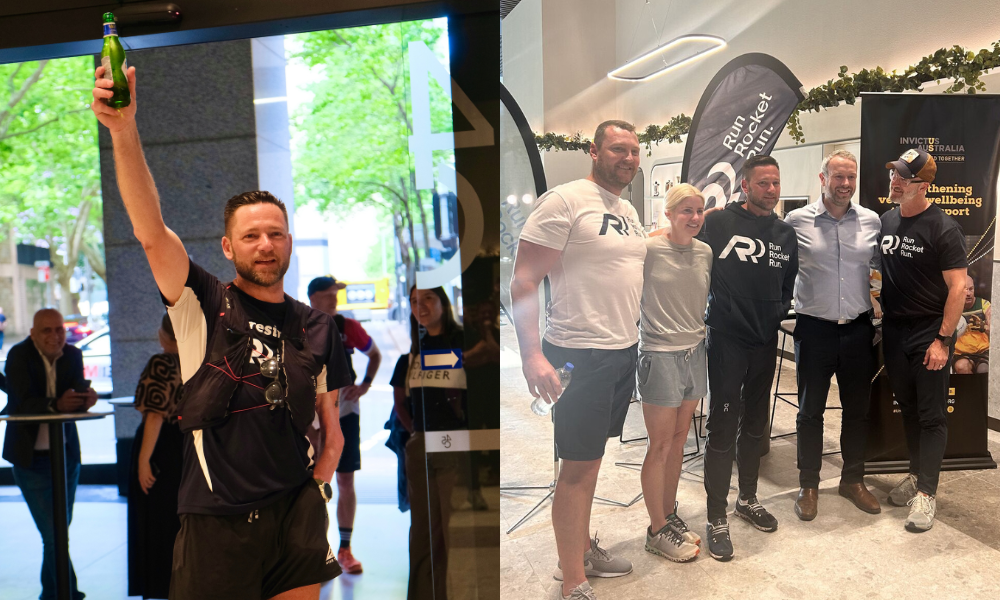Resimac sales manager completes event in just seven days

When the going gets tough, the tough get going – it’s an overused phrase, but when it comes to summing up the herculean efforts of Rodney ‘Rocket’ Cottam, it’s an apt description.
Cottam (pictured above), who works for Resimac as a regional sales manager for NSW, the ACT and Queensland, laced up his joggers on October 26 just south of Dubbo in western NSW and set out on an extraordinary week-long run to raise $56,000 for Invictus Australia.
After running for seven days, Cottam had notched up an impressive 560 kilometres when he finished his run in the Sydney CBD on November 1. That’s around 80km Cottam covered each day.
Part of the journey even included a hot lap of the Mount Panorama motor racing course in Bathurst (pictured below).

Overcoming major road accident
What’s just as remarkable as running 560km in seven days is the physical and mental battles the former Australian soldier has endured to even get to this point.
Cottam has been a keen runner since he was a youngster, but a motor vehicle accident when he was in the Army about 20 years ago brought this physical pastime and his four-year military career to an abrupt halt.
“I was back in Australia after being deployed overseas and I was heading back to base [at Holsworthy] one Monday morning and I got cleaned up by a car,” Cottam said.
The accident left Cottam with serious multiple injuries, including a spinal injury that resulted in brachial plexus palsy, permanent paralysis of his left arm. He also shattered his pelvis and had to learn to walk again. Cottam was pronounced dead on the scene but police were able to revive him.
Cottam said it took a number of years of rehabilitation before he was able to return to running.
“It took a while to get back into any sort of running because the nature of my injury being paralysed in my left arm. I don't have control in my left shoulder, the joint – it jolts around a bit,” he said.
“So I had to work my way back up into running on a treadmill, then just slowly building up to short distances, go five kilometres, then 10 kilometres, then marathons.
“I've built up to doing 100 kilometre races, 560 kilometres in seven days and just run forever now basically.”
He now averages about 200km each week.
When asked about the mental impacts of suffering such a serious accident, Cottam said his overseas military deployments taught him that there were other people far worse off than him..
“I got to see what other parts of the world are really like and what other people have to deal with in pretty dire situations, so it gave me a lot of perspective when I had the accident.
“You think, ‘What do I have to really complain about?’ I've still got it pretty good. I've still got family and friends. I live in a great country. I've still got everything available to me, so I can make a choice and either be a victim about it or make use of the second chance I had because I was dead on the scene.
“So to still be alive and still be able to do whatever I want to do … I was positive about it more than I was negative, that's for sure.”
Training for a 560km run
This is the third year in a row Cottam has completed a long-distance run to raise funds for Invictus Australia. The first time was in 2022, when he ran from the Southern Highlands in NSW to the top of Australia’s highest mountain, Mount Kosciuszko, a distance of 350km over five days.
Each year Cottam has upped the ante. In 2023, he ran for five days clocking up 500km from Port Macquarie on NSW’s Mid-North Coast to the Anzac memorial in Sydney’s Hyde Park.
“Each year we’re trying to do something a little bit more and going to different locations,” Cottam said.
It took a lot of planning and training to prepare for a 560km run over seven days.
Cottam said he made a plan at the start of the year, figuring how much training would be required to get his body and mind in the best shape to complete the run.
This included regular training; running each day as well as gym workouts for strength and mobility.
“I'll also incorporate races throughout the year. I try to do one race every month and they range from a backyard ultra of 100 kilometres or I’ll do some major trail races. I did five 100-kilometre races throughout the year and then incorporate the Sydney Marathon in there as well.”
‘Don’t sweat the small stuff’
During the 560km run, Cottam ran solo with two support crew travelling in a vehicle 5km to 10km in front of him. He usually stopped at the 40km halfway mark each day for a 20-minute break and to eat.
A typical day of running involved a 6am start and then Cottam would stop running 12 to 14 hours later, with the aim of getting eight hours sleep each night.
Cottam said it was about pacing the run and avoiding pushing his body too far and too hard.
“There’s a lot of science behind it.”
He was fortunate to suffer no physical injuries this year – last year he had a stress fracture in his foot from day one.
“So that was challenging. But this year, nothing physical, my body was really good. I didn't even get a blister.
“Mentally, the hardest things are being on a long stretch of highway, it's really hot, trucks are coming past you. You've got to really stay focused. It’s really mentally draining doing that for a number of hours at a time.”
Extremely loud cicadas that made his head ring were also a challenge, as was the fatigue of the run. Wombats, kangaroos and even an emu crossed Cottam’s path.
Cottam said having the backing of a great support crew helped him take his mind off things “and not sweat the small stuff”.
He was warmly welcomed at the finish line in Sydney CBD by family, friends and supporters, hosted at Resimac’s head office (pictured below).
“Resimac have been extremely supportive the whole time, hosting events and giving me time when I needed it,” Cottam said.

Supporting Invictus Australia with Run Rocket Run
What motivates Cottam to complete the runs and overcome his physical barriers is setting an example for others to follow, as well as supporting Invictus Australia. It’s an organisation that uses the power of sport to strengthen the physical and mental wellbeing of veterans and their families.
“The main reason is for me personally – to just keep pushing myself, to show myself what I'm capable of doing,” said Cottam.
“I'm just some guy who is paralysed in one arm and I run with my hand in my pocket. I've got a couple of muscles missing out of my legs. If I can do this surely that shows that people can get out there and do other things that they might not think they can do.”
Cottam said while running long distance was tough, it was only temporary compared to the tough battles veterans were going through. He knew a number of veterans that had struggled through mental and physical injuries..
“I’ve got to keep going, keep doing it for them … [running] is just a moment in time for me but for them it’s ongoing.”
While most people are aware of the Invictus Games, Cottam said the organisation was involved in much more than the games. He said Invictus Australia aimed to reconnect veterans with their families and communities through sports activities, which also helped their rehabilitation.
He said when he suffered his injuries, organisations such as Invictus didn't exist.
“It was basically just my units and the Department of Veterans Affairs. I was very lucky – I did have a lot of support. But over time we've had a lot more Australians being involved in conflicts around the world … my involvement with Invictus came about because I wanted to be able to give back and serve. While I don't wear the uniform any more, I still serve.”
Donations for Invictus Australia are still being accepted. You can help Cottam reach the $56,000 goal by donating here at Run Rocket Run



